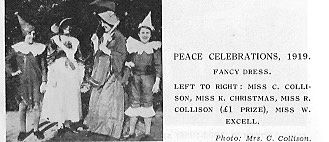On November 11th1918 fighting ceased on the Western Front and troops were gradually arriving home. People wanted to celebrate but the war was not yet officially over. The Peace Committee met for the first time on 9thMay 1919. Negotiations to set the terms of peace continued at the Paris Peace Conference until 1920 but, when the Treaty of Versailles was signed on 28thJune 1919, the government deemed negotiations were sufficiently close to a conclusion to begin arrangements for national celebrations to mark the end of World War One. Saturday 19thJuly 1919 was declared a Bank Holiday and a Public Holiday throughout the United Kingdom.
Goudhurst and Kilndown set up a committee to oversee arrangements for celebrations in their respective village.
GOUDHURST’Spreparations for peace celebrations began well before Peace Day was announced. They started with a public meeting in the Parish Hall on 1stApril and Dr. Collingridge, who was supported by the Rev. Canon W A Raikes and Mr J P Burfield, chaired the meeting. The plan was to discuss with parishioners what form the Peace Day celebrations should take. Dr Collingridge had found a copy of the programme for the Coronation celebrations in 1911 and suggested that might form the basis for peace celebrations. A sizeable committee was formed with Mr J C Gripper, headmaster of the Goudhurst School, elected as chairman and Len Prickett, a well known character who lived and worked in Church Road, was elected Secretary. A series of events was subsequently planned for the day and the vicarage field was lent for the occasion.
At intervals throughout the day the church bells were rung. There was a procession of flag-bearing schoolchildren from their schools in West Road to the vicarage field headed by the Goudhurst Brass Band and the Boy Scouts’ Band. A sports afternoon was organised for children and adults which included: a slow bicycle race, tilting the bucket, flat races, three-legged, egg and spoon and sack races for the different age groups. There were team events including relay races and a tug of war and there was also a special race for ex-service and discharged soldiers and sailors. Greatest fun of all was probably the pillow fight.
A fancy dress competition was well supported and competitors processed from the Plain to the vicarage where they were judged by Sir Charles and Lady Jessel, Dr and Mrs Harvey and Mrs Stockwell. There were prizes for the winners in three classes: children, ladies, and gentlemen. Prizes were also awarded for the best decorated perambulator, won by Mrs Vousden, and the best decorated single horse vehicle, won by Mr Phillips and his party for their entry called Sleeping Beauty. A special prize was awarded for a clown and donkey.

Between 3 o’clock and 5.30pm tea was served. The day was brought to a close with fireworks and a bonfire.
When the sports were finished, tea was served in Mr Fry’s field in Back Lane, first to the children and then to the adults. The whole village pulled together for the occasion. Mr Druce and Mr Popplewell each lent a large tent, Mr Davis provided tables and comfortable seats, Mr Brown of the Star and Eagle allowed the use of his scullery and coppers for making tea, and Mr Neeves lent a portable copper for use in the field. The day was rounded off with fireworks and at 11pm a bonfire was lit in the Glebe Field. An aerial balloon was released from the church tower, which had been floodlit by eight large motor lamps running off a generator.
Following the celebrations on 19th, a Victory Ball was held in Goudhurst Parish Hall on Wednesday 23rdJuly. The hall was colourfully decorated for the occasion. Fancy dress was optional and there were prizes to be had for the best. Around fifty people entered into the spirit of the occasion and there were many original and clever costume ideas. Miss Hills portrayed a ‘Military Wedding’ with one side of her profile the bride and the other the groom, Mr Remnant was an ‘Allotment Holder’, while Miss Young was ‘Peace’. The ball was well attended and dancing continued into the early hours of the following day.
KILNDOWNheld their celebrations in the Cricket Field, lent for the occasion by Mr Richer. Mr J Ager, the headmaster of Kilndown School, was secretary of the committee overseeing arrangements for the entertainment.
The day began with the ringing of the church bells. Then there was music by a string band from Tunbridge Wells. There were side-shows for the young men, a country dancing display by the school children, and a ladies versus gentlemen cricket match.
A series of sports events was arranged for the residents of Kilndown. There were flat races, hurdle, egg and spoon, sack, skipping, obstacle, three-legged and boot races. There was a baby-show for under two year olds, a skipping competition, a thread-needle race, a penny-polishing race, a potato race, high-jump and hat trimming competition. Every schoolchild taking part in the sports was given a prize.
